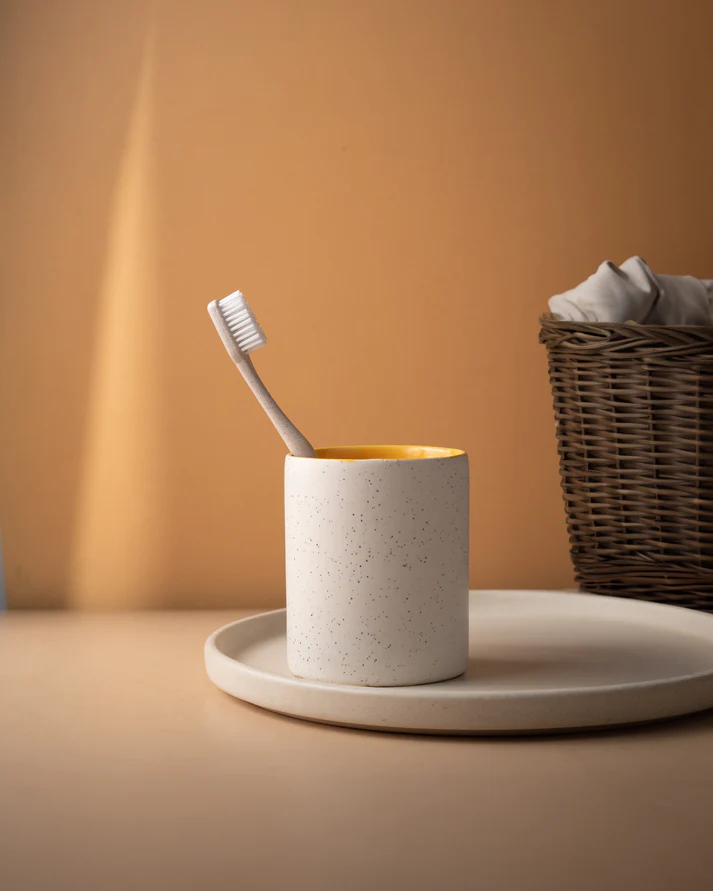Table Of Contents
- Summary
- Introduction
- Understanding Disposable Toothbrushes: A Sustainable Shift in Oral Care
- Evaluating Biodegradable Options: What to Look for in Eco-Friendly Toothbrushes
- The Environmental Impact of Your Choice: How Disposable Toothbrushes Affect Our Planet
- Making the Right Purchase: Where to Find Sustainable Disposable Toothbrushes
- Conclusion
- FAQ's

Key Takeaways
Disposable toothbrushes are undergoing a sustainable shift due to growing concerns about plastic pollution & environmental sustainability.
When evaluating eco-friendly toothbrush options, look for materials such as bamboo, wheat straw, or rice husks, and ensure the bristles are biodegradable or easily removable.
Traditional plastic toothbrushes contribute to plastic pollution, emphasizing the importance of choosing sustainable alternatives to support the well-being of our planet.
Finding sustainable disposable toothbrushes has become more accessible, with several brands and retailers offering biodegradable options online, in eco-friendly stores, and at local retailers.
Introduction
Are disposable toothbrushes harming the planet? As the world embraces sustainability, the shift towards eco-friendly alternatives has sparked a revolution in oral care. With the surge in demand for biodegradable toothbrushes, it's time to evaluate the impact of this sustainable shift. Discover how to make the right choice for the planet while maintaining optimal oral hygiene. Join us as we delve into the evolution of disposable toothbrushes and explore the environmental implications of our daily oral care choices. By the end of this blog, you'll gain valuable insights into sustainable oral care practices and find the perfect eco-friendly toothbrush for your needs.
Understanding Disposable Toothbrushes: A Sustainable Shift in Oral Care
Disposable toothbrushes have been a longstanding staple in oral care, offering convenience and maintaining hygiene. However, amidst escalating apprehensions regarding plastic pollution and environmental sustainability, there has been a noteworthy transition towards eco-friendly alternatives. With consumers displaying heightened awareness about their choices, the appeal for biodegradable toothbrushes has experienced a substantial upsurge.
The evolution of disposable toothbrushes has been marked by a growing emphasis on sustainability. Manufacturers are now prioritizing the use of biodegradable materials such as bamboo and wheat straw, thereby reducing the environmental impact. This sustainable shift signifies a pivotal moment in oral care, as it not only serves the functional purpose of maintaining oral hygiene but also aligns with the larger ecological objectives.
By opting for disposable toothbrushes crafted from sustainable materials, consumers contribute to diminishing plastic waste and promoting environmentally responsible practices. Furthermore, the burgeoning availability of these eco-conscious alternatives facilitates a seamless transition towards a more sustainable oral care regimen.
Evaluating Biodegradable Options: What to Look for in Eco-Friendly Toothbrushes
When it comes to choosing eco-friendly toothbrushes, evaluating biodegradable options is crucial to ensure that the product aligns with sustainability goals. By considering certain factors, you can make an informed decision that contributes to reducing environmental impact.
First and foremost, look for toothbrushes made from natural and renewable materials such as bamboo, wheat straw, or rice husks. These materials offer biodegradability and have a lower environmental impact compared to traditional plastic toothbrushes. Opting for a toothbrush crafted from these materials aids in decreasing the accumulation of plastic waste in landfills and oceans.
Furthermore, it's important to consider the bristles of the toothbrush. Ensure that the bristles are also biodegradable or easily removable before disposal. While the handle of the toothbrush may be biodegradable, traditional nylon bristles are not. Look for options with bristles made from biodegradable materials such as castor oil or other plant-based fibers.
By evaluating these factors, you can make a conscious choice when selecting an eco-friendly toothbrush. This comprehensive guide aims to help you navigate through the available options and make a positive impact on the environment through your everyday choices.
The Environmental Impact of Your Choice: How Disposable Toothbrushes Affect Our Planet
Regarding our dental hygiene routines, it's important to be mindful of the ecological footprint of the products we employ. This is particularly true for disposable toothbrushes, which have a significant effect on our planet. Traditional plastic toothbrushes are non-biodegradable, which means that they persist in the environment long after they are discarded. Consequently, they exacerbate the escalating problem of plastic pollution, with numerous products ending up in landfills or drifting into our oceans.
Once in the environment, these toothbrushes can have devastating consequences for wildlife and marine ecosystems. The plastic materials break down into micro-plastics, which can be ingested by animals, causing harm and disrupting the natural balance of ecosystems. The long-term implications of this pollution are far-reaching, affecting not only the environment but also human health.
Thankfully, with growing consumer awareness about their environmental choices, eco-friendly substitutes for conventional disposable toothbrushes are becoming available. Options that are biodegradable, crafted from materials like bamboo or wheat straw, present a greener alternative. These renewable and biodegradable materials aid in alleviating the impact of plastic waste on the environment.
By making informed decisions and choosing sustainable toothbrush options, we can actively contribute to the protection of our environment and the preservation of natural ecosystems. Each small choice we make in our daily lives can have an optimistic impact on the planet, and selecting eco-conscious oral care products is an important step in the right direction.
Making the Right Purchase: Where to Find Sustainable Disposable Toothbrushes
With the increasing popularity of sustainable goods, eco-friendly toothbrushes are now more accessible than ever. A broad selection of biodegradable toothbrushes is now offered by a variety of brands & stores, catering to the expanding community of environmentally mindful consumers. Whether you opt for the ease of online shopping, like exploring eco-conscious shops, or prefer to patronize local businesses, there are plenty of options available for those in search of sustainable disposable toothbrushes.
Here are some places where you can find sustainable disposable toothbrushes:
- Online Retailers: E-commerce platforms dedicated to eco-friendly products, such as Iridanaturals.com, offer a vast selection of sustainable disposable toothbrushes. In just a few clicks, one can explore various choices and have your selected toothbrush conveniently delivered right to your home.
- Eco-Friendly Stores: Visit specialty stores that prioritize sustainability and environmentally friendly products. These stores often curate a range of eco-conscious dental care items, including disposable toothbrushes made from sustainable materials like wheat straw.
- Local Retailers: Many local shops and stores now feature sections dedicated to eco-friendly living, and you may be pleasantly surprised to find sustainable disposable toothbrushes among their offerings. By patronizing local enterprises, you play a role in fostering environmentally responsible practices within your own community.
By choosing to purchase sustainable disposable toothbrushes, you actively support the transition towards eco-conscious oral care and contribute to the global movement for sustainable living.
Conclusion
Disposable toothbrushes have long been a convenient choice for oral care, but the shift towards eco-friendly alternatives is gaining momentum. Evaluating biodegradable options is essential, with a focus on materials like bamboo, wheat straw, or rice husks for a lower environmental impact. Understanding the environmental implications of disposable toothbrushes highlights the importance of choosing sustainable alternatives. As the demand for sustainable products grows, finding eco-friendly toothbrushes has become more accessible, with a range of options available from various brands and retailers. Transition to eco-friendly disposable toothbrushes and help pave the way for a healthier planet for the generations to come.
We'd love to hear your thoughts on making the shift to sustainable oral care. Leave a comment below and join the conversation on eco-conscious choices!
FAQs
Q1: What are the benefits of using disposable toothbrushes?
- Disposable toothbrushes are convenient for travel and on-the-go use.
- They are hygienic and reduce the risk of bacteria buildup compared to reusable brushes.
- Many disposable toothbrushes are made from eco-friendly materials, reducing environmental impact.
Q2: What eco-friendly options are available for disposable toothbrushes?
- Bamboo toothbrushes are a popular choice as they are biodegradable and sustainable.
- Wheat straw toothbrushes are another eco-friendly option, made from the byproduct of wheat production.
- There are also toothbrushes made from recycled materials like plastic or plant-based bioplastics.
Q3: How can I ensure the eco-friendly credentials of disposable toothbrushes?
- Look for certifications such as FSC which stands for Forest Stewardship Council for sustainable wood sourcing.
- Check for biodegradable or compostable labels to ensure minimal environmental impact after disposal.
- Research the brand's sustainability initiatives and ethical sourcing practices.


